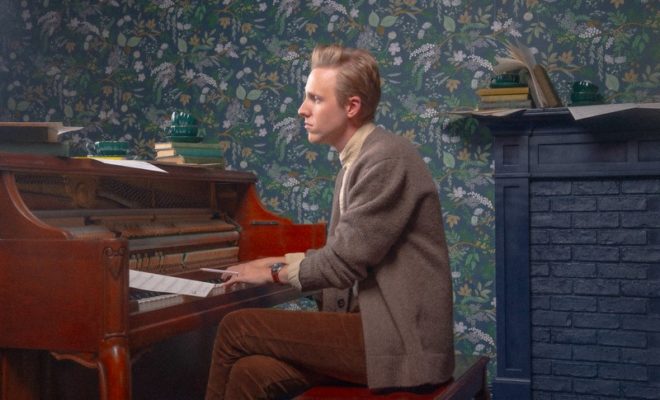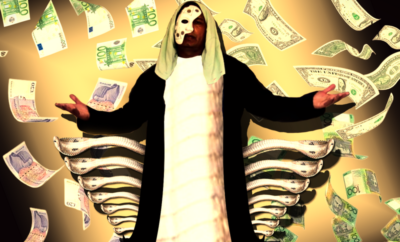
Interviews
Cody Fry – Eleanor Rigby
By: Jennifer Vintzileos
Q) How would you best describe your sound?
A) Well, I’ve been describing it recently as orchestral pop. I don’t know if that’s 100% accurate but that’s the best I can come up with currently.
Q) Who are your Top 3 musical influences?
A) Oh man, it’s always so difficult to answer a specific number of influences. But if I was forced to choose, I would choose John Williams, Coldplay and John Mayer. I think anybody who grew up when I did and played guitar, if they tell you they weren’t influenced by John Mayer, they’re just lying. [laughs]
Q) I am a die-hard Beatles fan and absolutely loved your take on “Eleanor Rigby!” Why did you decide to cover this song?
A) Well, I’ve always loved “Eleanor Rigby” ever since I had to do a lyric project about it in the sixth grade in my English class. Everyone was assigned a song to analyze the lyrics, and come up with a poetic meaning for it, and I was assigned “Eleanor Rigby.” Ever since, it’s been on my mind.
And during the pandemic, as I reflected on what we were all going through, “Eleanor Rigby” kept coming to mind. The pandemic brought a whole new meaning of the song for me, especially the refrain “ahh look at all the lonely people.” It became a therapy for me to work on that during the pandemic and dream up this big orchestral version of it.
Q) When creating your own arrangement of “Eleanor Rigby,” how important was it to you to not only pay homage to the band but also to bring your own flavor to the piece?
A) I love this question because when you’re covering a song by a band like the Beatles, it’s never going to be as good as the original no matter how hard you try. So, the best way forward is to just make it different. I didn’t want it to be like I was trying to do what The Beatles did. I wanted to try to bring my own meaning into it, and for me, I love working with orchestras. And so, it became obvious to do this song about loneliness and desolation. To then involve almost five hundred people to make the song, it creates this oxymoronic sense of loneliness. Like we’re all lonely together.
In terms of paying homage to the original, I wanted to give listeners moments where they go, “Oh yeah! I recognize that melody!” And I wanted to see how far I could push those melodies, bringing them into new orchestral context, reharmonizing and giving the song just a little bit of a new twist to further get into what the lyrics are about, to express the lyrical meaning in a musical way.
Q) You also did a Symphony Session with Ben Rector and the song “Sailboat,” another great masterpiece! How did his collaboration with you help in the process of creating the final product?
A) So, a quick backstory of “Sailboat” is that Ben and I used to perform it as the encore on tour together. I toured with Ben for five years as part of his band. So, in terms of the structure, we’ve been performing it as a duo for a long time. The way the process worked for “Sailboat” is I called Ben and said, “I think it would be really fun to perform Sailboat together and I would love to put an orchestra on it.” And Ben graciously said, “That sounds really cool!” Essentially, I did an entire virtual mockup of what the orchestra would sound like. I sent it to Ben. He said, “This is awesome,” and then we recorded it. So, it wasn’t like we were working together on the orchestration, but it’s the result of years and years of us performing the song together on tour. Great question.
Q) With The Symphony Sessions coming out on January 21, 2022, what do you hope fans take away from your music?
A) Oh man, a lot of things! The one that comes to mind right now is that the orchestra can be cool. It doesn’t just have to be in movies or in history books, the orchestra can be used in a way that feels current and enhances the musical spirit of whatever expression you’re trying to get across to listeners. I just hope people can see that this amazing art form is still relevant and really fun.
Q) When writing your compositions, which section (brass, woodwinds, percussion, etc.) is always the most challenging to write for and why?
A) I love this question! I’d say the most annoying to write for is percussion cause when you’re notating it, it’s very time consuming. But I think the most difficult section to write for is the section that’s not playing the main theme or melody. It’s very easy to just say, “Ok, French horns are going to play this line” and then write that line. But what to do with the rest of the stage is always the question. So, figuring out how complicated do I want these string voices to be how, how much brass, how little brass… those are the decisions that take me a long time to make.
Q) You found success on TikTok with the song “I Hear A Symphony.” In your own thoughts, how is social media a benefit to artists who are looking to share their work with the masses?
A) Social media is a godsend for artists. There are no gatekeepers anymore. There is just what you the artist are putting out to the world. So, I can make whatever I want, and I don’t have to get permission from anybody, and I can just put it out and see if there’s an audience for it. Much to my surprise, there is an audience for “I Hear a Symphony.” That is not what I would of guessed, genuinely. I think the way social media has encouraged people to do that thing that is unique to that person is really cool.
Q) Instead of joining a label you have remained an independent artist. Why did you decide to do that and what are the benefits of getting to have your hands in all aspects of your music?
A) I love this question, thanks for asking it. For most of my career, I was independent, not necessarily by choice but just because that it was all that was available to me. Recently, as labels have approached, I realized that the thing that matters to me more than anything else is to make the art that I want to make and to put it out whenever I want to put it out. The second you sign with a label, there is someone else who has to approve of what you’ve done and tell you when you’re allowed to put it out. While I don’t think labels are stifling you, it’s another layer of saying, “What if they say no to this thing I’m really excited about?” How would that feel? So, once labels started approaching I realized this was actually something that really makes my life worth living. If I wasn’t able to make the thing that I was uniquely suited to make, then what’s the point? If I’m just churning it out because I think it’s gonna be successful or because somebody else wanted me to, I’m living someone else’s dream, not mine.
The other thing is that financial deals with record labels can be one-sided, and as an independent artist who’s scrappily fought his way up for the last ten to fifteen years, it’s hard to give away percentages because you’re used to having 100%. And now that there’s actual revenue coming in, it’s hard to give that up. So, a lot of times the financial arrangements are not beneficial to me at this point; however, I would probably work with a label in the future as things grow.
Great question.
Q) What would you like to say to your fans and supporters of your music?
A) Obviously… thank you. There’s no way I get to do this without fans, and one of my favorite things about music and art in general is that I can spend time creating this thing, and it’s mine. But the second I release it into the world, it is now also everyone else’s. And to see the things fans have created and the way this music has been integrated into their lives, it’s the thing that keeps me going. When I’m having a bad day, I look on TikTok and all these insane videos that people are having so much fun making and I just go, “This is really cool!” And I’m so grateful to be able to do what I do, and the reason I’m able to do it is because of you guys. So, thank you for supporting me during this weird orchestral season of my life, and I hope you like what comes next.
Cody Fry was just nominated for his first ever GRAMMY Award in the Best Arrangement, Instruments and Vocals category for his cover of The Beatles’ “Eleanor Rigby.”





You must be logged in to post a comment Login